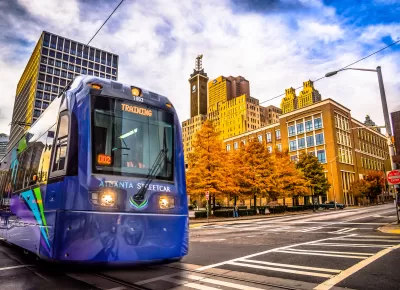The commissioner of the Georgia Department of Transportation warned Atlanta Mayor Kasim Reed and MARTA CEO Keith Parker that unless corrective actions are not taken in many areas, e.g., maintenance, safety, he will shut down streetcar service.

"In a letter to Mayor Kasim Reed and Metropolitan Atlanta Rapid Transit Authority (MARTA) CEO Keith Parker on [May 23], the Georgia Department of Transportation gave the city until June 14 to submit plans to address 60 outstanding problems outlined in the reports," writes David Wickert for The Atlanta Journal-Constitution. "If those plans are not sufficient, GDOT said, it will order the streetcar to shut down immediately."
The city and MARTA share responsibility for the $98 million system that runs in downtown Atlanta. State and federal law requires GDOT to oversee the safety and security of rail operations like the streetcar, GDOT Commissioner Russell McMurry said.
McMurry wrote that since the service started in December 2014, streetcar officials have failed to “provide timely, substantive and compliant responses to deficiencies identified by the department and (Federal Transportation Authority).”
The problems with the streetcar include poor maintenance procedures, inadequate staffing and a failure to properly investigate accidents.
Not all news was bad. In an optimistic note, McMurry informed The Atlanta Journal-Constitution that "the department expects the problems will be resolved."
But how did the problem gets to this point? Does responsibility lie with MARTA?
Last year, the Federal Transit Administration expressed concerns about the safety and operation of the streetcar. Among other things, it found defects in the streetcar’s overhead electrical system, poor operating procedures, significant management and staff vacancies and failure to comply with state accident reporting requirements.
“Clearly, MARTA’s overall ‘active management’ role, as the entity ‘directly responsible for the day-to-day management of the Atlanta Streetcar,’ has not been sufficient to date,” FTA Region IV Administrator Yvette Taylor wrote on Sep. 3, 2015, reported The Atlanta Journal-Constitution's Katie Leslie last September.
Leslie wrote in January that according to a GDOT report, "the city and MARTA lack clarity when it comes to their roles in running the streetcar." She went on to list problems the ongoing problems that ultimately led to the May 23 letter.
"State Sen. Vincent Fort, D-Atlanta, traced the problems to the city’s involvement in running the streetcar," adds Wickert. "He wants MARTA to operate the system and earlier this year introduced an unsuccessful bill that would have put the system under its control."
Ridership plummets
Meeting GDOT's reporting requirements is not the streetcar's only problem, writes Wickert.
After offering free fares for a year, the streetcar started charging $1 in January. Ridership plummeted. About 91,000 people rode the street in the first three months of this year – 48 percent less than the same period in 2015.
An April post indicated that Atlanta has "big plans to extend the line." Before expanding to 50 miles, as the city hopes, the first priority must be to address urgent operational concerns that revealed themselves in the first phase, the 2.7-mile downtown route.
FULL STORY: State threatens to close Atlanta streetcar

Planetizen Federal Action Tracker
A weekly monitor of how Trump’s orders and actions are impacting planners and planning in America.

Maui's Vacation Rental Debate Turns Ugly
Verbal attacks, misinformation campaigns and fistfights plague a high-stakes debate to convert thousands of vacation rentals into long-term housing.

Restaurant Patios Were a Pandemic Win — Why Were They so Hard to Keep?
Social distancing requirements and changes in travel patterns prompted cities to pilot new uses for street and sidewalk space. Then it got complicated.

In California Battle of Housing vs. Environment, Housing Just Won
A new state law significantly limits the power of CEQA, an environmental review law that served as a powerful tool for blocking new development.

Boulder Eliminates Parking Minimums Citywide
Officials estimate the cost of building a single underground parking space at up to $100,000.

Orange County, Florida Adopts Largest US “Sprawl Repair” Code
The ‘Orange Code’ seeks to rectify decades of sprawl-inducing, car-oriented development.
Urban Design for Planners 1: Software Tools
This six-course series explores essential urban design concepts using open source software and equips planners with the tools they need to participate fully in the urban design process.
Planning for Universal Design
Learn the tools for implementing Universal Design in planning regulations.
Heyer Gruel & Associates PA
JM Goldson LLC
Custer County Colorado
City of Camden Redevelopment Agency
City of Astoria
Transportation Research & Education Center (TREC) at Portland State University
Jefferson Parish Government
Camden Redevelopment Agency
City of Claremont




























